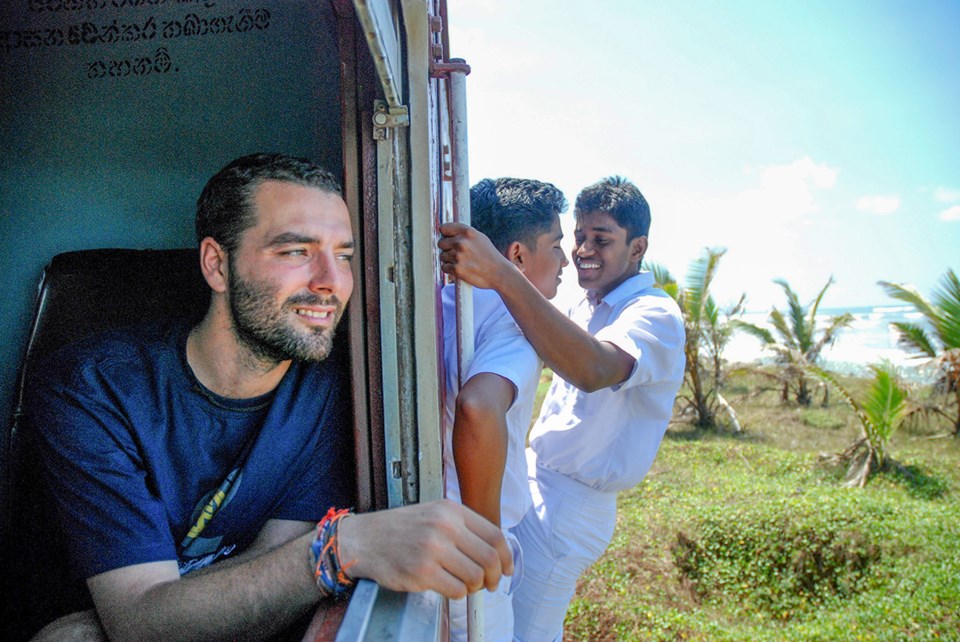Troy Shantz
Sarnia’s Steve Hunter was hiking along a muddy trail in Macedonia when the pistol appeared.
“Passport!” the teen demanded, two thugs on either side edging closer.
Hunter was into the second month of walking a route that follows an ancient Roman road to Istanbul. He thought the young cattle-herders were joking.
They weren’t.
Hunter, 39, has spent the past 12 years backpacking across five continents. He’s survived a car crash and been held at knifepoint. When short on cash, he works the Australian carnival circuit.
“The road just started to seep into my bloodstream,” he said via video call from Almaty, Kazakhstan, where he’s hunkered down during the COVID-19 pandemic.
Hunter was a few days from the Greek border when he ambled passed the Macedonian cattle-herders.
He showed his passport, the teen lunged for it, and Hunter fought back.
The trio, who were carrying sticks, quickly overwhelmed him. Most of the blows hit his canvas backpack though and he eventually managed to escape. The pistol, as it turned out, was a pellet gun.
The Northern Collegiate grad began his 12-year sojourn in New Zealand, then Australia, working in restaurants and a farm. But the carnival circuit proved the most lucrative.
He prepared to return home in 2010 when his grandma in Sarnia had cancer. But she’d have none of it, he said.
“(She said), ‘Don’t come see me die. Follow your dreams, live your life.’ That’s when the full-time backpacker turned on.”
Within months he had ascended to the base camp of Mount Everest, witnessed a goat being slaughtered on an Indian street, and, for his 30th birthday, dined on snake heart in Vietnam.
When cash ran low he’d returns to Australia for a few months.
“Every possible dollar I can earn in those carnivals is more time I can spend moving through these other countries,” he said.
But he tired of the tourist traps, and began wandering the back roads of Indonesia, Malaysia, Bali, Philippines and Myanmar, among others.
“I just got lost in tiny villages and just walked around,” he said. “I spent a lot of time hosted by villagers. I just got really addicted.”
In 2011 Hunter headed to Egypt where he earned an English-language teaching certificate. Next came Israel, Palestine and Jordan, before spending four years in Europe.
“It’s really hard to hitchhike (in Europe). People are paranoid. Except when I was with my big-breasted German girlfriend,” he said with a laugh.
In 2014, he joined the Camino de Santiago pilgrimage through Spain, a fabled 500-mile hike he learned about from other travellers in Southeast Asia.
“I went and I walked for 35 days. That was another game changer. I just started meeting people… more and more people like me. I just started building a family.”
The experience helped refine his opinion on how travel should be done: Take your time, and spend it learning about the people and origins of the country you’re in.
After working in a French vineyard on a forged passport, he landed a teaching job in Slovakia. Next, he embarked on the four-month Rome-to-Istanbul pilgrimage, which follows the route of the ancient Roman road.
He camped beside the trail and along the way picked fresh apricots and figs.
“I stayed in so many villages. And the people were just so amazing. I’d been looking for a long time in Europe for this specific thing, with very minimal tourism. I finally got it.”
Hunter has documented his adventures through 80 countries in journals and photos, compiling material for three books he hopes to publish one day.
The second manuscript follows the legendary pilgrimage routes he did on foot through southern and Eastern Europe.
The third book, half done, examines the death of the traditional explorer and the glorification of social-media travel.
“The idea is to say, look, you don’t need to have a lot of money to travel long-term. You don’t need to be an Instagram sensation,” he said.
“You can go and be and live. And people will be there to help you.”
After covering 3,500 kilometres of Europe on foot and hitchhiking more than 100,000 kilometres, he’s thinking of coming back to Sarnia.
“The town’s streets and parks circulate through my mind more and more with passing time,” he said.
